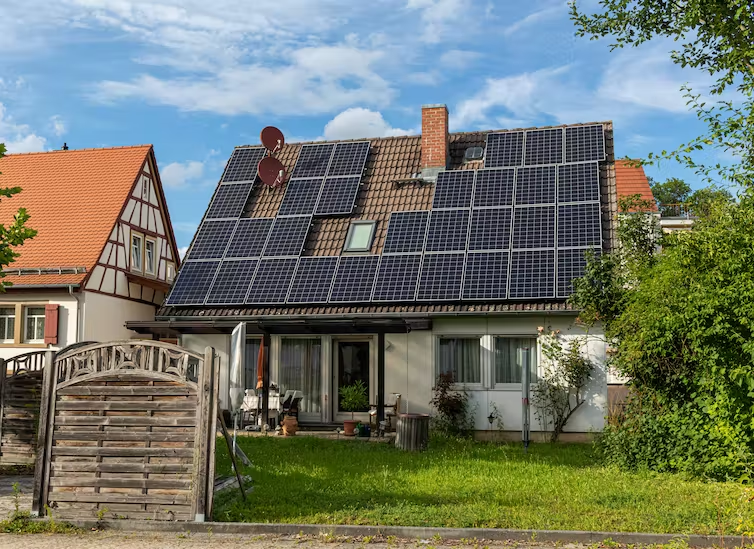· 4 min read
The UK government’s plan for achieving net zero greenhouse gas emissions by 2050 is at a serious risk of sinking before it’s been fully launched. With the Treasury having rejected a request by MPs to come up with a “clear funding plan”, there’s now every chance that an already bad plan will turn into no plan at all.
Things aren’t looking any better in Scotland. On 10 May, Scotland’s minister for zero carbon buildings, Patrick Harvie MSP, called on the UK government to rethink its “woefully inadequate” plans to insulate homes and tackle fuel poverty – central elements of the UK government’s net zero strategy, which would eliminate 20.8% of the UK’s emissions if successful.
But in November 2021 – when Harvie was himself questioned on where £33 billion of funding to decarbonise Scottish homes by 2045, as set out in the Scottish government’s Heat in Buildings Strategy, would come from – he couldn’t answer the question. And to make matters worse, figures published by the Scottish pro-independence think tank Common Weal suggest the real cost of decarbonising Scottish homes could easily be double that.
Here are just some of the reasons why the Treasury, and the Scottish government, are heading for an abject failure in funding net zero:
The public sector can’t foot the bill: Research by Inside Housing has put a price tag of £104 billion on decarbonising all the UK’s homes, with an upper estimate of £250 billion – equivalent to just under a quarter of the government’s total projected spending for 2022-23.
Householders can’t foot the bill: That same research estimates a decarbonisation cost of between £2,500-£50,000 per household (without any government subsidies), although from my research experience it seems likely most homes would be facing costs at the upper end of that scale. For comparison, UK average disposable household income in 2021 was £31,400. With the ongoing cost of living crisis, that number is likely to fall substantially.
Disproportionately affects low-income households: Households with the lowest incomes face the greatest costs for improving their energy efficiency. Many banks and building societies now offer “green mortgages” to fund improvements – subject to credit checks – but with the economy in such a precarious state, taking on more debt is a significant risk both for lenders and lendees.
Lack of investment from private sector: Private investors don’t have the confidence to invest in net zero plans. That’s because, in the absence of strong regulation forcing construction companies to decarbonise, retrofitting buildings to cut their carbon use is very expensive. Plus, improving energy efficiency reduces the amount of energy suppliers are able to sell. And when it comes to building new homes, developers who want to squeeze every ounce of profit from their sales have enough lobbying power to water down green housing targets in their new builds.
Poor measurements: Decisions about decarbonising buildings are based on Energy Performance Certificates (EPCs), measurements based on a range of assumptions and proxy data that have never been validated to any meaningful degree. This means that EPCs frequently under- and over-estimate the costs and benefits of the efficiency improvements they recommend, giving investors little confidence in how much energy decarbonisation efforts will save.

The real returns on achieving net zero plans are reduced emissions and energy bills, improvements in public health and wellbeing and increased resilience against climate change. Unfortunately, that doesn’t necessarily spell money for the private sector.
But even if money were no object, the UK construction industry is simultaneously facing a serious skills and materials shortage, amplified by the Brexit brain drain and the COVID-driven boom in home improvements. And even if decarbonising every home in the UK was successful, the government will still need to tackle all the other critical issues for achieving net zero, including energy generation, transport, agriculture and many more.

One option that could begin to provide funding for net zero – and slowing climate change – would be a windfall tax on fossil fuel companies, ideally followed by taxation on their historical profits from contributing to the climate crisis.
But the world’s biggest polluters are so confident that governments won’t take the necessary action that they have placed massive bets against them in the form of “carbon bombs” that would blow any chances of averting catastrophic climate change out of the water. These “bombs” include 195 enormous oil and gas projects across the world which, if not stopped, will release over a billion tonnes of carbon dioxide each – equivalent to 18 years of current global CO₂ emissions.
This makes it all the more important that the chancellor of the exchequer, Rishi Sunak, makes good on his threat to impose such a tax. Backing down now would leave the net zero agenda dead in the water.
This article is also published on The Conversation. Illuminem Voices is a democratic space presenting the thoughts and opinions of leading Sustainability & Energy writers, their opinions do not necessarily represent those of illuminem.






